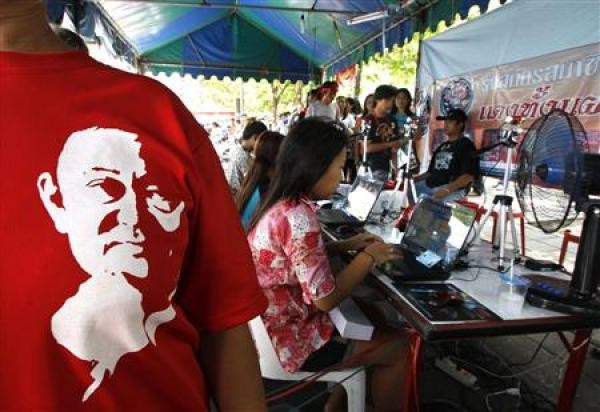Thailand elections: Could exiled Thaksin be the new coalition government’s main threat?

Thailand's outgoing defence minister has said the army will not intervene after supporters of exiled former Prime Minister Thaksin Shinawatra swept to another resounding general election victory.
Thaksin's younger sister Yingluck, who fronts the Puea Thai party, announced she had agreed a coalition deal with four minor parties that would give the new government 299 seats.
According to preliminary election commission results, which are not yet final, Puea Thai won an absolute majority with 264 seats in the 500-seat parliament.
By rapidly allying with four other minor parties, the Puea Tai party clearly attempts to prevent the opposition from openly question Yingluck's win and thus paves the way for her to become the country's first female prime minister.
Thaksin was toppled by a military coup in 2006 and now lives in Dubai as a fugitive due to an abuse of power conviction that he says was politically motivated. His Thai Rak Thai party and its successor were also disbanded and many of their leaders banned from politics.
Yet despite being banned and in exile, the politician continued to command massive popular support, as the electoral landslide showed.
Despite Yingluck insisting that she would be in charge and will be taking decision on her own, the Puea Thai campaigned on the promise: Thaksin thinks - Puea Thai does.
Yingluck said her first task was the "roadmap to reconciliation" after years of unrest. She also cited the need to tackle high prices, improve international relations and curb corruption.
Meanwhile, outgoing Democrat Prime Minister Abhisit Vejjajiva said he had decided to step down as party leader, although his right-hand man, Surichoke Sopha, also a Democrat MP, said he believed the party still wanted Abhisit.
Surichoke added: "I don't think this [Puea Thai] government will last long ... They will have to compromise with the ruling class and at the same time satisfy the grassroots."
The presidential election has showed that the country is increasingly divided between Thaksin and Yingluck supporters, which are mainly made up of the rural poor and new money, and the Vejjajiva camp, composed of the old elites the urban middle classes.
The schism became even more entrenched when more than 90 people died as the military cracked down on Thaksin-supporting protesters in the centre of Bangkok last year. While redshirt leaders were jailed over the demonstrations, the government refused to acknowledge that the army had caused any deaths.
As many feared that the results could plunge the country into more chaos, General Prawit Wongsuwan, a former army chief close to leaders involved in the ousting of Thaksin, said the military would not intervene or stop Yingluck forming a government. "I can assure you that the military has no desire to stray out of its assigned roles," he told Reuters. "The army accepts the election results."
Political analyst Chris Bakeralso told the BBC : "They always say they have nothing to do with politics and then they keep interfering." But he added: "They are obviously feeling quite sensitive after the last five years. They know they made a mess of it.
"They are going to be very reluctant to make a move that puts them in the public eye in politics. They are going to pull the strings of the [anti-Thaksin, conservative and monarchist] yellowshirts and that sort of thing. I think we are more likely to see a formula of street demonstrations and judicial action [than coups]."
Activist and former senator Jon Ungpakorn believed the scale of the Puea Thai win should offer protection against a coup even in the long term.
"I'm not so concerned about the army now and more that the [anti-Thaksin] People's Alliance for Democracy and ultra-nationalist and monarchist sections of society may cause trouble."
Many insist that one of the main threats to the Yingluck regime is Thaksin's semi-covert involvement. Since the politician is banned from political activity in Thailand, opponents could try to disband the partyby claiming his contribution is against the law.
Democrats have made it clear they will challenge Puea Thai wins in particular constituencies on legal grounds, but as Puea Thai won a large amount of seats, it might now be harder for them to successfully oppose the party's policies.
Senator Ungpakornaslo also said: "At the same time we need a lively criticism of the new government and not allow Puea Thai to behave like the old Thaksin government trying to stifle political opposition and criticism."
Speaking from Dubai, Thaksin told reporters: "In Thailand, things are changing. I don't think a coup d'etat will happen again soon."
However, Puea Thai will now have to carefully establish its plan of action and examine the country's situation and the people's political preferences, as experts warn that any attempts to bring back Thaksin too quickly, will only galvanise the opposition and increase tensions between the two camps, which in turn could lead to a surge of violence.
© Copyright IBTimes 2025. All rights reserved.





















